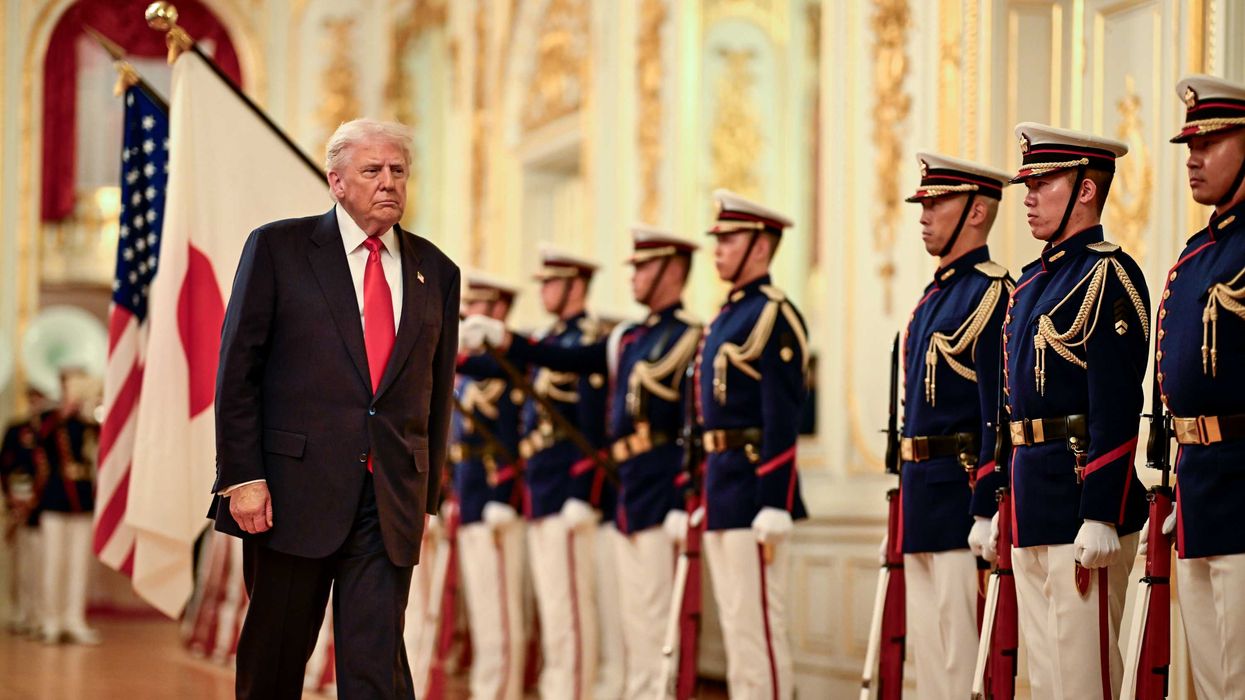New York Times Magazine writer Matthew Purdy says that the use of vague rules by President Donald Trump and his administration to "justify arbitrary and capricious" actions is intentional, establishing a "clear line between democracies run by laws and autocracies run by strongmen."
Citing federal judge William Young's "searing" opinion on Trump's cancellation of research grants by the National Institutes of Health, Purdy says that Trump's "broadly cast executive orders" were intentional.
Young said that by setting up Diversity Equity and Inclusion (DEI) as "some sort of boogeyman," Trump administration officials “decided that they are going to ‘eradicate’ something that they cannot define.”
Young's critique, Purdy explains, faults "the administration for using broadly cast executive orders and policies to justify “arbitrary and capricious” actions.
This is known as the "vagueness doctrine, a concept that for centuries has been foundational to American law," Purdy explains.
"Unless laws are clearly stated, citizens cannot know precisely what is and is not permitted, handing authorities the power to arbitrarily decide who is in violation of a law or rule," he writes.
This doctrine is a common autocratic technique, Purdy says.
"Vagueness has long been seen as a clear divide between democracies run by laws and autocracies run by strongmen, leading American administrations of both parties to routinely criticize foreign governments for using vague laws to suppress unwanted speech and behavior."
This vagueness has also "become fundamental to the way Trump operates," Purdy explains, and "it is not so much a legal strategy as a power dynamic."
Purdy says this dynamic is evident in Trump's targeting of so-called "woke culture," an attack that judges have deemed "ill-defined."
"In a sense, Trump is creating a system of rules and punishments all his own. And when those rules are vaguely defined — unlike, say, a speed limit or even complex financial regulations — there is no assurance that anyone can be safely outside the zone of violation," he says.
And while Trump "saw the dangers of vagueness" as a private citizen facing indictments for the retention of classified documents nad his own lawyer Todd Blanche argued that the underlying law was vague, he has, Purdy says, "flipped the script" in his second term.
"Following the killing of the right-wing provocateur Charlie Kirk, Trump and his associates appear to be drawing up a fresh batch of broadly defined violations to catch their political enemies — a strategy critics say is akin to how authoritarians use vague accusations to target opponents," Purdy says.
Vagueness, he explains, "breeds trepidation, perhaps the desired result."
International law professor at the University of Chicago Tom Ginsburg, ho has written about the decline of democracies around the world, says that "vagueness is part of the tool kit."
Vagueness, Purdy explains, "has been seen as antithetical to due process and the rule of law since the earliest days of American democracy."
The nation's founders warned in the Federalist Papers against laws "so incoherent that they cannot be understood” or those that change so often “that no man, who knows what the law is today, can guess what it will be tomorrow.”
Conservative Supreme Court Justice Neil M. Gorsuch wrote in a 2018 Supreme Court opinion that “Vague laws invite arbitrary power," siding with his liberal colleagues in striking down a provision, which he said lacked "clear criteria", used to try to deport a Filipino man, a legal permanent resident, who was convicted of burglary.
“A government of laws and not of men can never tolerate that arbitrary power,” Gorsuch wrote.
And despite Trump's many attempts, "None of Donald Trump’s edicts have deployed vagueness as effectively as his attack on D.E.I.," Purdy says. "Less understood is the recipe that makes the anti-D.E.I. campaign so effective: equal parts vagueness and threat."
What began in Russia, explains Purdy about vagueness, has now gone global, Purdy says.
"Today strongmen around the world often use vague laws to constrain groups that challenge their power," he says.
Trump's attacks on law firms have exemplified this as well, Purdy says.
Trump targeted the law firm WilmerHale through an executive order, claiming the firm engaged in activities detrimental to national interests and was associated with Robert Mueller's Russian interference investigation.
The order aimed to bar the firm's lawyers from federal buildings and revoke their security clearances. However, a federal judge struck down the order, ruling it unconstitutional and an attempt at political retribution — a decision supported by other federal judges.
"Judge Richard J. Leon, a George W. Bush nominee, said he agreed with the firm’s assertion that the executive order left no doubt that WilmerHale is being punished because it has represented some of the president’s political opponents and advanced positions with which he disagrees," Purdy writes.
“The order essentially leaves it to WilmerHale to predict which causes and which attorneys the president personally dislikes and then steer clear of those causes and attorneys,” Leon wrote. “This chilling effect triggers serious vagueness concerns.”


